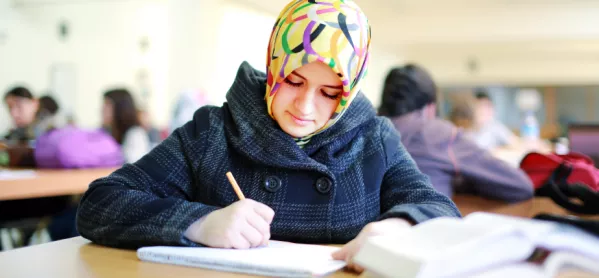Muslim pupils sitting exams during Ramadan should be told about the flexibility in Islamic law for people to delay or exempt themselves from fasting and late-night prayers if they believe that their performance could be affected, heads leaders have advised.
A paper, produced by the Association of School and College Leaders (ASCL), offers heads information to help them talk to Muslim pupils and their families about how they can balance their Islamic obligations and exams.
It says pupils need to “seriously and thoughtfully take their future and their studies into account” when deciding how they will observe Ramadan this year, a new advice paper says.
Highlighting the potential effects fasting can have on “cognitive performance”, the paper offers advice to schools on safety - such as what to do if a fasting student is showing signs of dehydration or exhaustion.
It warns that grades at GCSE and A level are “critical”. “Young people should be made aware that Islam does not require them to put their futures in jeopardy,” it says.
The document comes after the Joint Council for Qualifications (JCQ) said in January that it had scheduled some of the exams taken by the largest number of candidates so they fell outside of the fasting period, or in the mornings.
Later, Ofsted chief inspector Michael Wilshaw criticised the idea of accommodating religious festivals in the exam timetable, saying that it “set a very bad precedent” and risked all religious groups “piling in” to have exams moved.
ASCL says it does not present any particular interpretation of Islamic law, for example, from what age people should fast, or who can be exempt.
The paper also highlights the downsides of fasting, including tiredness, low energy, dehydration, reduced focus, memory or concentration.
It says: “Young Muslims and families, particularly those sitting exams this summer, will need to balance their obligations as Muslims with their studies and the importance of examinations for their futures, noting that the pursuit of education is also a religious and moral duty for all Muslims.”
The paper is endorsed by a wide range of British Muslims, including both Sunni and Shia.
ASCL parliamentary specialist Anna Cole said that the guidance of scholars, imams and others had provided “expert insight” into how to support students during Ramadan.
She said: “We hope this information will provide a positive opportunity for schools and colleges to engage with and help Muslim students and families to make these important decisions for themselves.”
Khola Hasan, of the Islamic Sharia Council, who was one of the consultees, said: “Many Muslim students are able to keep the long summer fasts as well as revise and sit exams. But for those who think their performance may be affected, the paper offers options that are in accordance with Islamic guidelines. The Islamic tradition has an established history of discussion, debate and reasoning. There are many concessions for hardship in observing religious commandments.”




